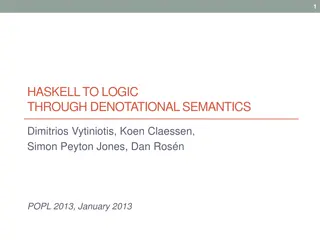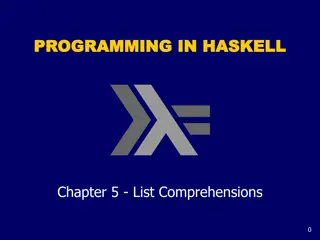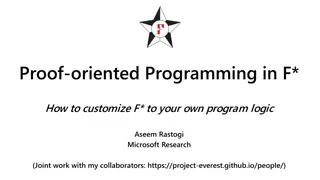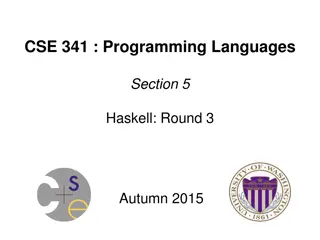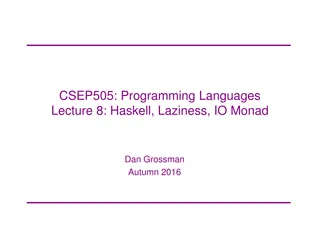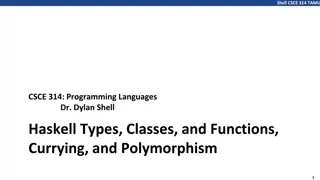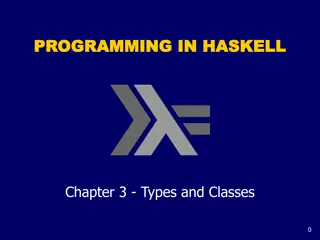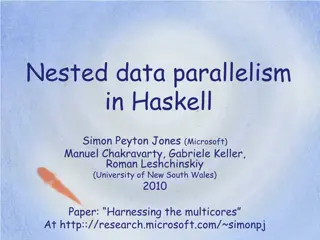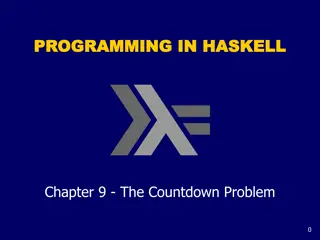Meta-programming in Haskell: A Closer Look at Splices and Quotations
Explore the world of meta-programming in Haskell through splices and quotations. Learn about successful extensions introduced by Simon Peyton Jones and Tim Sheard, including practical examples like generating source code using splices that are type-checked and compiled at compile time. Dive into con
0 views • 45 slides
Automated Static Verification of Higher-order Functional Programs
Explore the automated static verification of higher-order functional programs, focusing on Haskell code. Learn about denotational semantics, program assertions, and tools like GHC for verification. Discover the emphasis on simplicity and structural properties for easy proofs. Consider utilizing exis
0 views • 22 slides
Understanding List Comprehensions in Haskell Programming
In Haskell programming, list comprehensions provide a concise way to construct new lists from existing ones. By following comprehension notation similar to mathematics, you can generate sets and lists based on specified criteria. The order of generators and the use of dependent generators can signif
0 views • 22 slides
Exploring Proof-Oriented Programming in F*
Learn how to customize F* to tailor to your program logic with insights from Aseem Rastogi from Microsoft Research. Delve into the world of F* programming, a functional language akin to OCaml and Haskell, featuring advanced type systems and interactive proof capabilities. Discover examples, details
0 views • 23 slides
Student Finance Office Information and Payment Options
Student Finance Office at 1051 Haskell St., Fort Worth, TX provides services like cashier services, payment options, installment plans, waivers, refunds, and more. Key points include financial obligations and payment deadlines. Payment options include in-person at the cashier's office or online thro
0 views • 14 slides
Introduction to Haskell Programming Languages - Round 3 Autumn 2015
Explore the Octopus Interpreter project for CSE 341 Programming Languages course. Reminder on Monads in Haskell and dos and don'ts in code conversion. Dive into scope understanding with examples of printing and mapping in Haskell functions.
0 views • 18 slides
Understanding Garbage Collection in Programming
Garbage collection automates memory reclamation, freeing programmers from manual memory deallocation tasks. This process enhances program reliability, reduces errors, and decouples memory management from other software engineering concerns. Originating in LISP in 1960, garbage collection has become
0 views • 25 slides
Exploring Haskell Programming Language
Haskell is a functional programming language, similar to ML but with unique features like lazy evaluation and monadic IO. It was designed in the 1980s and 1990s to unify lazy languages research efforts and continues to evolve. This lecture covers the history, features, and applications of Haskell, e
0 views • 51 slides
Object-Oriented Software: Specification and Verification
This resource delves into theory, techniques, and architectures for verifying object-oriented software, focusing on a basic program verifier for dynamically allocated objects. It covers specification styles, verification conditions, modeling execution traces, states, and commands in a variety of lan
0 views • 11 slides
Understanding Haskell Types, Classes, Functions, and Polymorphism
In Haskell, types are collections of related values, ensuring type safety through compile-time type inference. Type errors occur when functions are applied to arguments of the wrong type. Annotations help define types, and Haskell offers basic types like Bool, Char, String, Int, Integer, Float, and
0 views • 30 slides
Understanding Types and Classes in Haskell Programming
Types in Haskell are names for collections of related values, allowing for safer and faster programs by catching errors at compile time. Haskell supports basic types like Bool, Char, String, Int, Integer, and Float, as well as list and tuple types. Type errors occur when functions are applied to arg
0 views • 27 slides
Overview of Nested Data Parallelism in Haskell
The paper by Simon Peyton Jones, Manuel Chakravarty, Gabriele Keller, and Roman Leshchinskiy explores nested data parallelism in Haskell, focusing on harnessing multicore processors. It discusses the challenges of parallel programming, comparing sequential and parallel computational fabrics. The evo
0 views • 55 slides
The Countdown Problem in Haskell Programming
The Countdown problem, popularized by a British television quiz show, challenges players to use given numbers and arithmetic operators to reach a target number. This Haskell programming chapter explores evaluating expressions, applying operators, and formalizing the problem. Learn how to construct e
0 views • 23 slides
Tackling the Awkward Squad in Functional Programming
Functional programming is known for its beauty in concise abstractions and high-order functions, but it often struggles with managing the "Awkward Squad" of input/output, imperative state, and error handling. The Direct Approach involves dealing with side effects and imperatives directly but can lea
0 views • 43 slides
Understanding Noise*: A Verified Secure Channel Protocol Library
Explore Noise*, a library of high-performance secure channel protocol implementations that have been verified for correctness. The Noise protocol examples, such as IKpsk2, showcase key exchange patterns used in applications like WhatsApp and Wireguard VPN. Discover the importance of verified impleme
0 views • 18 slides

